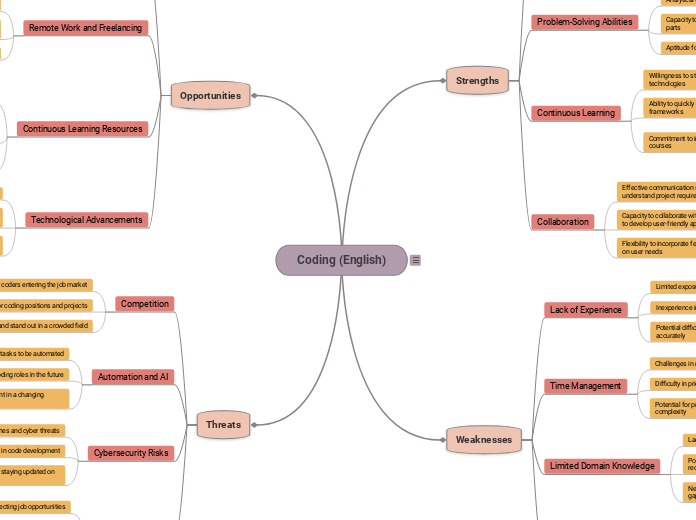Coding (English)
Strengths
Technical Skills
Proficiency in multiple coding languages (e.g
Java
Python
C++)
Knowledge of various programming paradigms (e.g
object-oriented
functional)
Ability to write clean and efficient code
Problem-Solving Abilities
Analytical thinking and logical reasoning skills
Capacity to break down complex problems into manageable parts
Aptitude for finding creative solutions to coding challenges
Continuous Learning
Willingness to stay updated with the latest coding trends and technologies
Ability to quickly adapt to new programming languages and frameworks
Commitment to improving coding skills through online courses
forums
etc
Collaboration
Effective communication skills to work in teams and understand project requirements
Capacity to collaborate with designers and other stakeholders to develop user-friendly applications
Flexibility to incorporate feedback and iterate on code based on user needs
Weaknesses
Lack of Experience
Limited exposure to real-world coding projects
Inexperience in handling large-scale software development
Potential difficulty in estimating project timelines and scope accurately
Time Management
Challenges in managing time effectively while coding
Difficulty in prioritizing tasks and meeting deadlines
Potential for procrastination or getting overwhelmed by project complexity
Limited Domain Knowledge
Lack of expertise in specific industries or domains
Potential difficulty in understanding complex business requirements
Need for additional research and learning to bridge knowledge gaps
Debugging and Troubleshooting
Potential struggles in identifying and resolving coding errors and bugs
Challenges in efficiently debugging complex code
Need for further development of debugging skills and techniques
Opportunities
Growing Demand for Coding Skills
Increasing reliance on technology across industries
Expanding job market for skilled coders
Potential for career growth and advancement opportunities
Remote Work and Freelancing
Rise of remote work culture and freelance platforms
Ability to work with clients globally and explore diverse projects
Flexibility in managing own schedule and work environment
Continuous Learning Resources
Availability of online coding courses
tutorials
and resources
Access to coding communities and forums for knowledge sharing
Opportunities for specialization in specific coding languages or frameworks
Technological Advancements
Emergence of new programming languages and frameworks
Potential for innovation and development of cutting-edge solutions
Possibility to stay at the forefront of technological advancements
Threats
Competition
High number of aspiring coders entering the job market
Intense competition for coding positions and projects
Need to differentiate skills and stand out in a crowded field
Automation and AI
Potential for certain coding tasks to be automated
Threat of AI replacing some coding roles in the future
Need to adapt and upskill to stay relevant in a changing landscape
Cybersecurity Risks
Growing concern over data breaches and cyber threats
Need to prioritize security practices in code development
Requirement for continuous learning and staying updated on security measures
Economic Factors
Uncertainty in the global economy affecting job opportunities
Reduction in IT budgets leading to decreased demand for coding services
Need to adapt to economic fluctuations and diversify skillset
